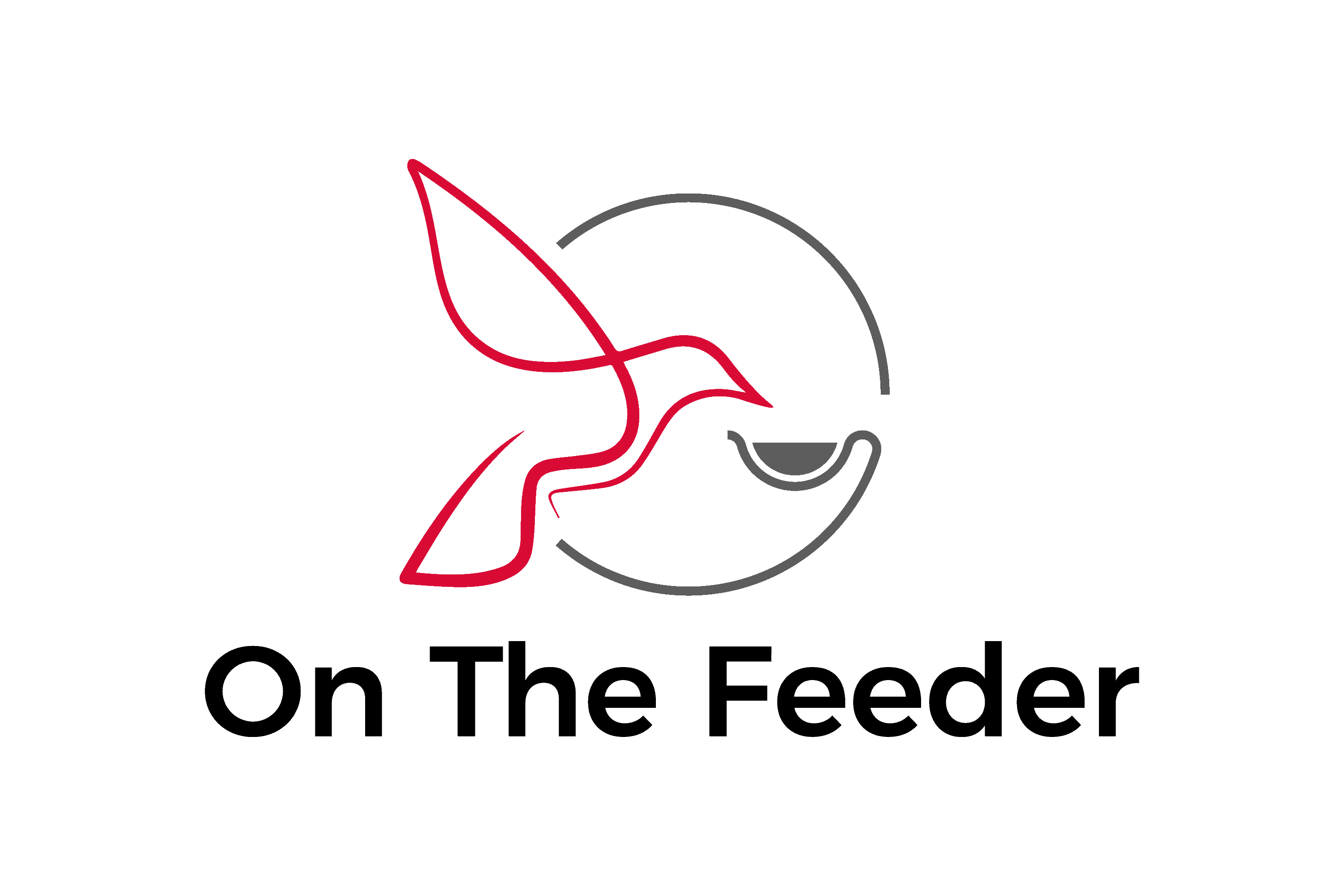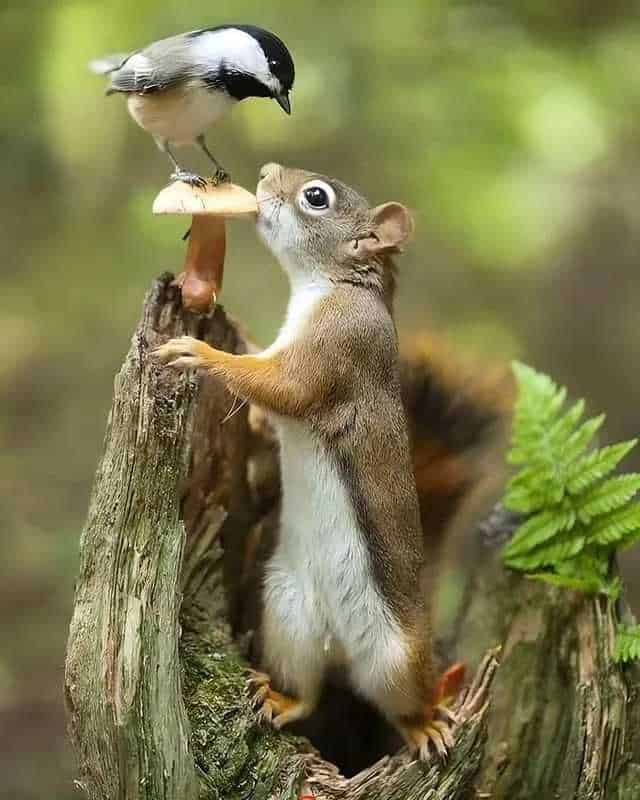The chatter of birds at a feeder brings a delightful charm to any backyard. But what if your haven is infiltrated by bushy-tailed intruders? Read on to reclaim your bird feeder from the clutches of squirrels!
Key Takeaways
- Utilizing squirrel deterrent strategies, such as specialized feeders and creative placement, helps ensure birds can feed uninterrupted.
- Causing harm to squirrels or any wildlife is not an acceptable or ethical solution to the problem.
- The goal of these strategies is not to eradicate squirrels, but to balance our enjoyment of bird watching with the squirrels’ natural behaviors in a safe and humane manner.
The delight of observing vibrant birds frolicking in your backyard, nipping enthusiastically at a carefully curated mix of birdseed, is a pleasure shared by many of us (over 82 million in the US alone).
But when this serene scene is infiltrated by a nimble squirrel, that blissful birdwatching experience can quickly turn sour. The sight of these little critters gobbling up birdseed and scaring away your feathered visitors is, to say the least, frustrating.
You’ve tried, with limited success, to figure out how to keep squirrels out of backyard bird feeders. Luckily, your search for solutions has brought you to the right place.
11 Strategies to Keep Squirrels Away From Bird Feeders
As bird watchers, one of our common challenges is figuring out how to keep squirrels out of feeders. These lively critters, while interesting to watch, often monopolize backyard bird feeders, leaving our feathered friends without a meal.
Here are 11 strategic approaches to ensure birds can enjoy their meals undisturbed by these furry intruders:
- Choose bird foods squirrels dislike
- Position bird feeders strategically
- Invest in squirrel-proof bird feeders
- Select the right squirrel-proof bird feeder pole
- Use squirrel baffles
- Attach a slinky
- Keep the area under bird feeders clean
- Setup separate feeders for squirrels
- Hang Irish Spring soap
1. Choose Bird Foods Squirrels Dislike
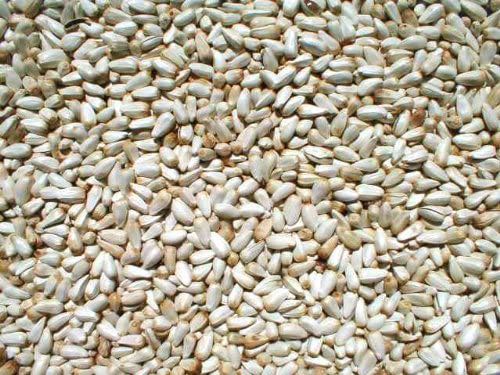
Squirrels are notorious for their love of birdseed, nuts, sunflower seeds, fruit, and corn. However, their culinary preferences don’t extend to all types of bird food sources.
By introducing safflower seed, nyjer seed, and white proso millet into your feeder, you’ll maintain a bird-friendly environment while subtly discouraging squirrels. These seeds lack appeal to squirrels but are a favorite among many bird species, ensuring your feeder remains a hub of avian activity.
2. Position Bird Feeders Strategically
Keeping the feeder 12 feet away from a shrub or an evergreen tree can provide birds with an accessible safe zone, allowing them to feed undisturbed. This distance is just right, as it allows birds to swiftly retreat to safety, while predators find it hard to sneak up unnoticed.
Incorporating additional protective measures such as chicken wire or thorny branches around ground-level backyard feeders can further boost the safety of birds while keeping unwanted visitors at bay.
3. Invest in Squirrel-Proof Bird Feeders
Squirrel-proof bird feeders serve as an efficient tool to deter these agile climbers.
Designed with special mechanisms, such as weight-activated seed protection, these feeders close off access to the seed reservoir when a squirrel attempts to feed while allowing lighter birds to feast freely.
Alternatively, some models are equipped with a spinning perch that unseats squirrels without harming them.
4. Select the Right Squirrel-Proof Feeder Pole
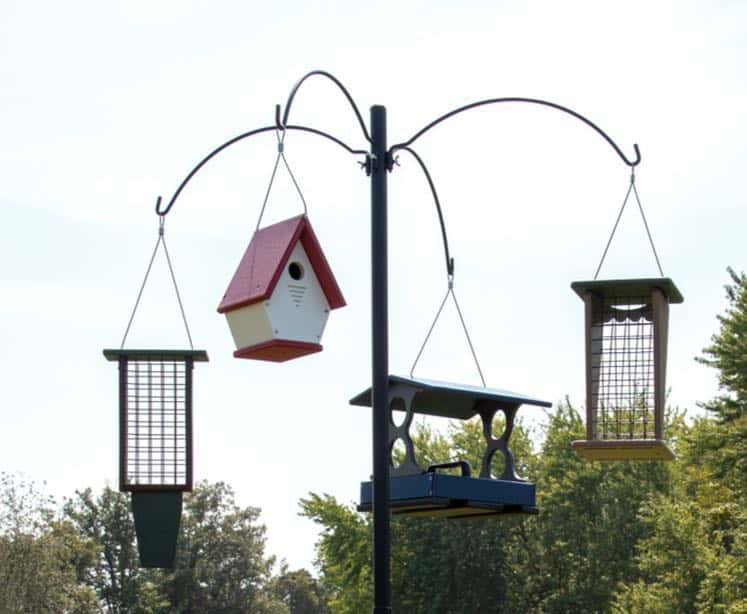
A sturdy, well-designed bird feeder pole can act as an effective deterrent against squirrels. After extensive testing, I’ve identified certain key features to consider when selecting the right squirrel-proof feeder pole:
- Strength & Stability: This is a vital aspect as the pole needs to withstand the weight of the feeder, the birdseed, and the birds, all while resisting the attempts of persistent squirrels.
- Capacity & Usability: The pole should be able to support the size and weight of your preferred bird feeder and allow you to easily refill and clean the bird feeders.
- Squirrel-Proof: Poles with a smooth surface make it difficult for squirrels to climb. Some models even feature built-in squirrel baffles for added protection.
- Ease of Installation: Ideally, the pole should be easy to install and move as needed.
If you want to delve further into the specifics, feel free to check out my in-depth squirrel-proof pole guide.
5. Use Squirrel Baffles for Effective Squirrel Deterrence
Squirrel Baffles – conical or cylindrical structures placed on feeder poles – act as physical barriers that prevent squirrels from climbing up to the feeder. Positioned correctly on the pole, they interrupt the squirrel’s upward trajectory, causing it to slide back down harmlessly.
As a bonus, they often add a visual element to your bird feeding setup, combining functionality with aesthetics.
6. Attach a Slinky to Deter Squirrels
Adding a Slinky to your bird feeder pole introduces an unexpected hurdle for squirrels. Known for their ability to stretch and bounce, Slinkys can perplex and stop even the most persistent climbers.
When a squirrel attempts to ascend the pole, the Slinky expands, causing the intruder to descend with a gentle bounce. Securing a Slinky to the pole is a simple, cost-effective strategy to maintain the sanctity of your bird feeders.
Plus, just like with squirrel baffles, the sight of a Slinky in action brings a dash of retro charm to your backyard setup.
7. Keep The Area Under Bird Feeders Clean
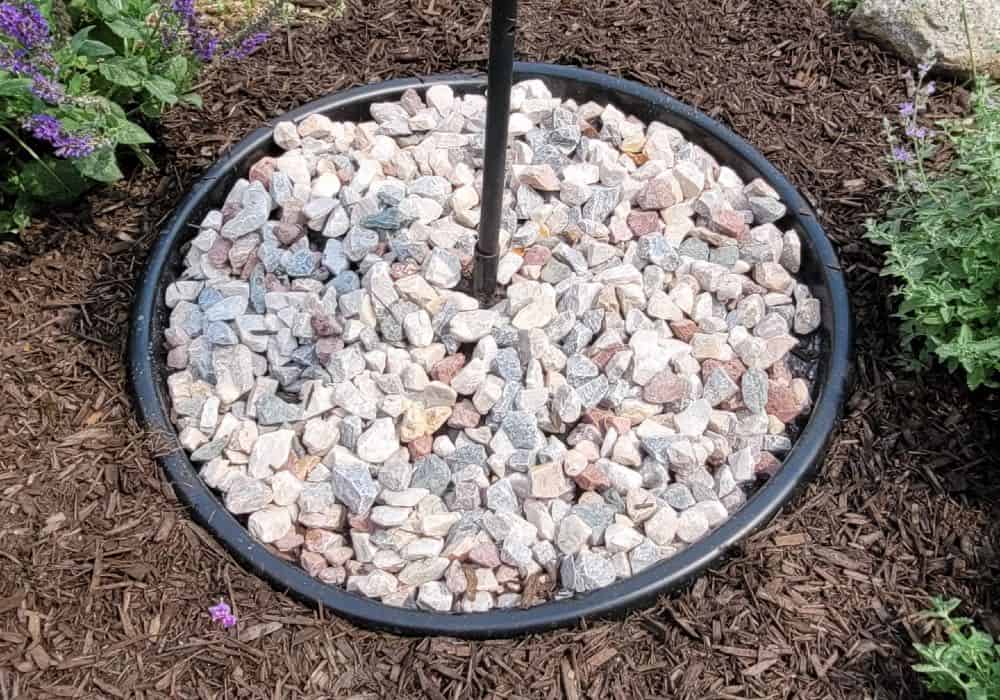
Keeping the area beneath your bird feeders clean can dissuade squirrels from visiting. Accumulated seed and debris can attract squirrels, providing them with an easy meal. Therefore, regular cleaning not only reduces this lure but also promotes better hygiene for your avian guests.
8. Create Obstacles to Deter Squirrels
Creating physical obstacles can impede squirrels’ access to your bird feeders. Deploying these barriers on and around your feeder stand can help to outfox these agile climbers. Consider these options:
- Aluminum Ducting: Lightweight yet sturdy, this can be fastened around the pole to deter climbing.
- Plastic Pipe: Slipping over your feeder pole, its smooth surface can be tricky for squirrels to grip.
- Chicken Wire: This can be molded into a protective cage around the feeder.
- Spinning Objects: Objects like CDs strung along the feeder line can bewilder squirrels with their motion and reflective surfaces.
- Motion-Activated Sprinklers: A sudden spray of water can startle and discourage squirrels.
9. Set Up Separate Feeders for Squirrels
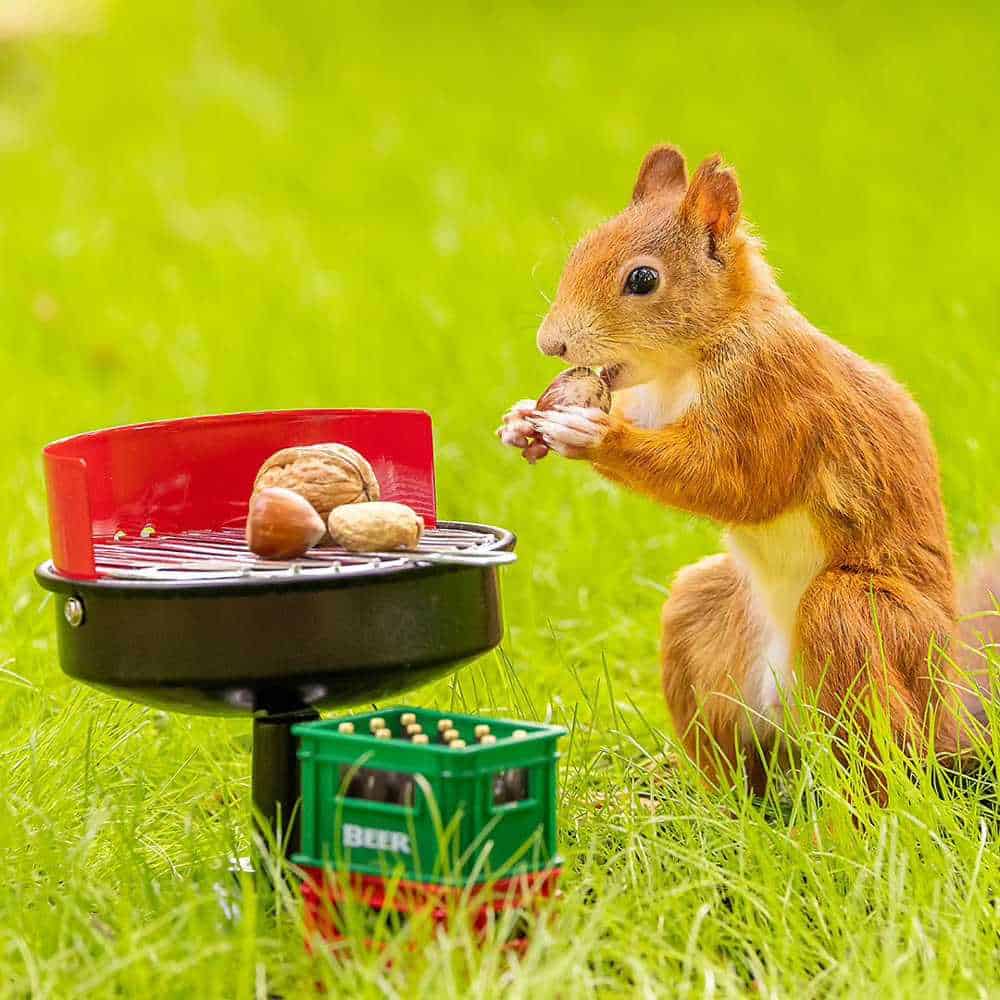
Consider setting up a separate feeding station for squirrels, filled with their preferred foods. By creating an appealing, squirrel-friendly zone, you can redirect their attention away from the bird feeders. This co-existing approach allows you to enjoy a bustling backyard ecosystem without the constant competition for birdseed as the sole food source.
10. String Soda Bottles for Squirrel Deterrence
One strategy for squirrel deterrence incorporates something you may already have at home: empty 1-liter soda bottles. To construct a soda bottle squirrel-deterring bird feeder:
- Fix a wire between two trees.
- Make a hole in the bottom of a few empty soda bottles.
- Slide these bottles onto the wire.
- Between the bottles, suspend your bird feeder.
As squirrels try to navigate the slippery, spinning bottles, their progress toward the bird feeder is thwarted, effectively stopping them from reaching your bird feed.
You can also use soda bottles for homemade baffles too!
11. Hang Irish Spring Soap to Repel Squirrels
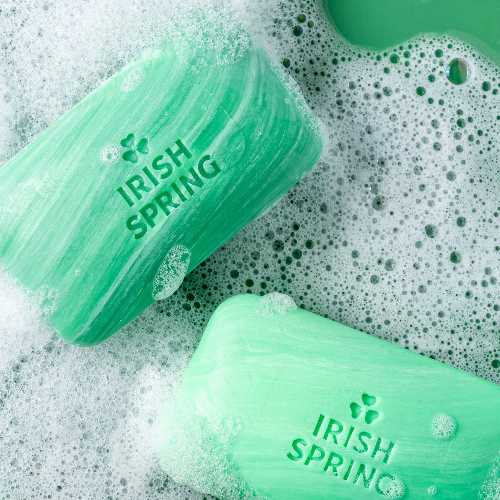
An unusual but effective way to keep squirrels out of feeders involves hanging bars of Irish Spring soap near your bird feeders. Squirrels find the scent of this specific soap displeasing, so it acts as a natural repellent.
5 Tactics to Avoid
While our goal is to stop squirrels from monopolizing bird feeders, it’s vitally important to remember that these creatures are an integral part of our ecosystem. All measures should be humane, causing no harm to squirrels or any other wildlife. In this light, there are certain tactics that must be avoided:
1. Don’t Use Capsicum From Hot Peppers
Though capsaicin—the active component in hot peppers—may seem like a feasible option to ward off squirrels, it should not be your go-to solution.
Studies indicate that capsaicin-treated birdseeds can deter squirrels, while birds, surprisingly, are unaffected by the heat due to their lack of sensitivity to capsaicin.
However, the problem arises when this potent compound is used in powdered form. The capsaicin dust can irritate birds’ eyes, which counters our intention of providing a safe and welcoming feeding environment.
Even though incorporating capsaicin in a more secure form, like suet mix, seems less problematic, the potential risks still make this tactic an unfavorable one.
2. Don’t Kill (Shoot, Cat, Dog, Poison)
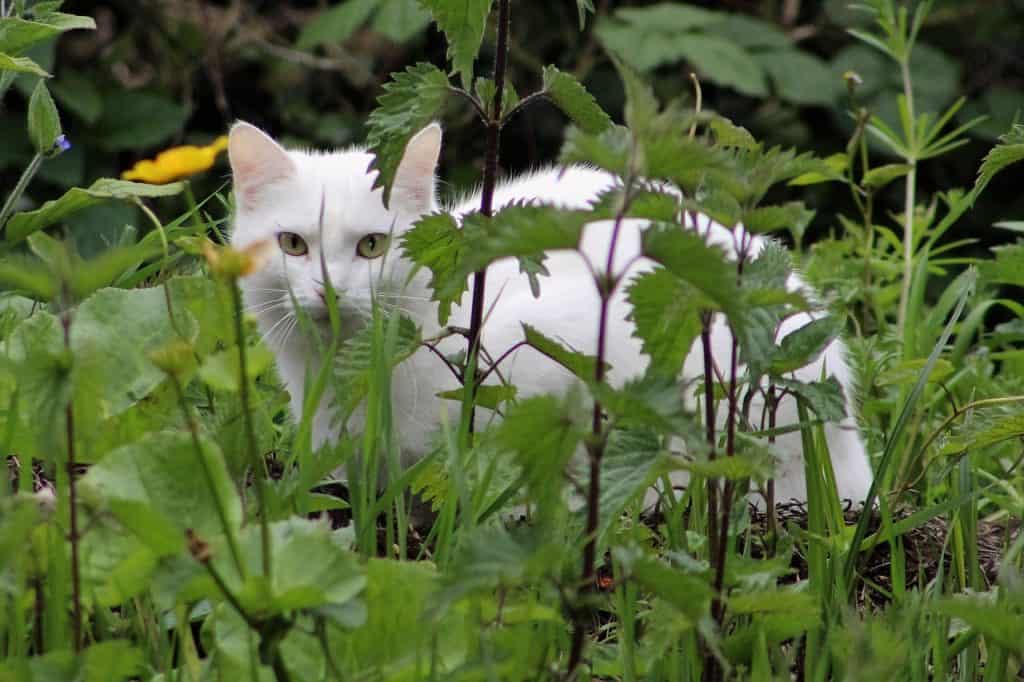
While it’s understandable that squirrels can be frustrating for bird enthusiasts, here’s why resorting to harm should never be an option:
- Shooting: Besides the potential legal implications depending on your jurisdiction, this method is inhumane and disrupts the natural balance of wildlife. It’s also unlikely to be effective in the long run as other squirrels will simply move in to replace the ones lost.
- Cats and Dogs: Using pets as a deterrent can risk their well-being, as squirrels can carry diseases and parasites. This approach also raises ethical issues about using animals against each other.
- Poison: Not only is it inhumane and illegal in many places, but poison can also unintentionally harm other animals, including your intended feathered guests. It can also contaminate the environment.
The welfare of all animals should always be respected. There are many humane, effective strategies for dealing with squirrels around bird feeders without resorting to killing.
3. Don’t Use Glue Or Other Adhesives
Glue boards, though they may seem like a straightforward solution to squirrel issues, are far from being humane or safe.
These adhesive-coated trays, often marketed as pest control tools, trap animals in an insidious way, leading to prolonged suffering and eventual death by starvation or suffocation. They are one of the most distressing and dangerous wildlife control products available, despite their widespread accessibility.
Avoid these methods, as they cause unnecessary harm to squirrels and can also inadvertently endanger other innocent creatures.
4. Don’t Use Petroleum Jelly Or Grease
Coating surfaces with petroleum jelly or grease might seem like an easy (and funny) way to deter squirrels, but it poses significant health risks.
A squirrel that comes into contact with these substances will instinctively clean its fur by licking, inadvertently ingesting toxic materials.
Small quantities can upset their digestive system, while larger amounts can cause more severe damage, even lung damage if aspirated. These products can also cause irritation or injury if they get into a squirrel’s eyes and can even harm the birds themselves.
5. Don’t Use Electric Wire
Installing electric wires as a deterrent to squirrels is highly discouraged. The use of such extreme methods can lead to severe injuries, pain, and in worst-case scenarios, fatalities in these small creatures. Furthermore, this approach can also pose a risk to other wildlife, pets, and even humans.
Conclusion
Understanding how to keep squirrels away from feeders is a balance of providing for our feathered friends while simultaneously deterring these acrobatic foragers. With an array of humane and effective strategies, it is indeed possible to maintain harmony in your backyard without causing harm to any of its visitors.
